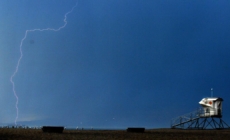-
Astros vs. Pirates Highlights | MLB on FOX - 15 mins ago
-
Man who claimed to be Trump’s ‘assassin’ pleads not guilty to threats - 20 mins ago
-
Marjorie Taylor Greene Partially Agrees With Elon Musk on Trump-Backed Bill - 31 mins ago
-
Search relaunched for Madeleine McCann who disappeared in 2007 - 44 mins ago
-
Two children injured in Inglewood after suspect flees police and crashes, authorities say - 60 mins ago
-
Rockies vs. Marlins Highlights | MLB on FOX - about 1 hour ago
-
Micah Parsons Finally Clears the Air - about 1 hour ago
-
California Senate passes bill that aims to make AI chatbots safer - 2 hours ago
-
New York Knicks part ways with Tom Thibodeau — Right call or big mistake? | Speak - 2 hours ago
-
How to Watch The Ultimate Fighter: Live Stream Team Cormier vs Team Sonnen Episode 2, TV Channel - 2 hours ago
Photos Show Snow on Florida Beach While There’s None in Alaska Wilderness
Florida, best known for its sandy beaches and balmy temperatures, has had several inches of snowfall this week as photos from AccuWeather show the amount of snow in Pensacola compared to no snow in Alaska’s wilderness.
Newsweek has reached out to the National Weather Service (NWS) via email for comment on Saturday afternoon.
Why It Matters
Unusually cold temperatures in central Florida have led to winter weather advisories, with rain and strong winds adding to the winter-like conditions. The cold snap is part of a broader weather pattern bringing rare winter weather to parts of the Southeastern U.S.
Florida was among the Southern states that saw accumulating snow, so much so that it was visible from space. Meanwhile, Alaska, known for its extremely cold and snowy climate, has experienced some rare warm weather this month.
What To Know
In a post on X, formerly Twitter, on Friday afternoon, AccuWeather shared photos showing the difference in snow in the two states as Alaska is historically known to have high snow accumulations in January.
“Well, this is unusual! Photos taken Thursday show snow on a Florida beach and no snow in the Alaska wilderness. Historically, Juneau averages 25 inches of snow in January, but it has only had 8.1 inches so far. Pensacola received 8.9 inches on Tuesday,” AccuWeather wrote.
Well, this is unusual! Photos taken Thursday show snow on a Florida beach and no snow in the Alaska wilderness.
Historically, Juneau averages 25 inches of snow in January, but it has only had 8.1 inches so far. Pensacola received 8.9 inches on Tuesday. pic.twitter.com/VhciiqQex1
— AccuWeather (@accuweather) January 24, 2025
The photos come after winter storms hit the Southeast on Tuesday stretching from Texas up through part of the Eastern Seaboard.
In Florida, extreme cold warnings were in place across the panhandle, including in Tallahassee. When coupled with wind chill, some areas experienced temperatures that felt as low as 4 degrees Fahrenheit, even though the actual temperature was higher.
Earlier this week, there were no extreme cold warnings in place in Alaska as this January is set to be just outside the top five warmest for Anchorage and outside the top 10 warmest for Fairbanks, according to Alaska’s News Source.
While parts of Alaska are experiencing unusually warm temperatures, the NWS has since issued several winter weather alerts for The Last Frontier.
The NWS issued a winter weather alert for the Southern Denali Borough until 3 a.m. Sunday local time, with snow accumulations of 10 to 20 inches in the area.
The weather service also issued a winter weather alert for the following areas until 3 a.m. Monday local time: Middle Yukon Valley, Lower Yukon and Innoko Valleys, North Slopes of the Western Alaska Range and Upper Kuskokwim Valley. There will also be snow accumulations of 10 to 20 inches in those areas.
Miguel J. Rodriguez Carrillo/Getty Images
What People Are Saying
NWS meteorologist Kristian Oliver previously told Newsweek: “For January, the average minimum temperature [in Tallahassee] is around 40 degrees, the average max temperature is around 64.”
Despite being a far cry from average, Oliver said Tallahassee’s coldest January temperature on record occurred in 1985 when the temperature reached 6 degrees.
AccuWeather senior meteorologist Tom Kines said: “This is a once-in-a-lifetime event for a lot of these folks down there.”
The National Weather Service (NWS) said in various winter weather alerts on Friday: “A Winter Storm Warning for snow means severe winter weather conditions are expected or occurring. This will make travel very difficult or impossible.”
“Slow down and use caution while traveling,” the weather service said in other Friday winter weather alerts.
What Happens Next
According to a six- to 10-day temperature outlook from the NWS Climate Prediction Center, a warming trend will take place in Florida. Temperatures are expected to be above normal.
During the same time period, temperatures will likely be below normal for the western half of Alaska, including in Anchorage. Alaska News Source said that the state should cool down starting next week.
Source link































